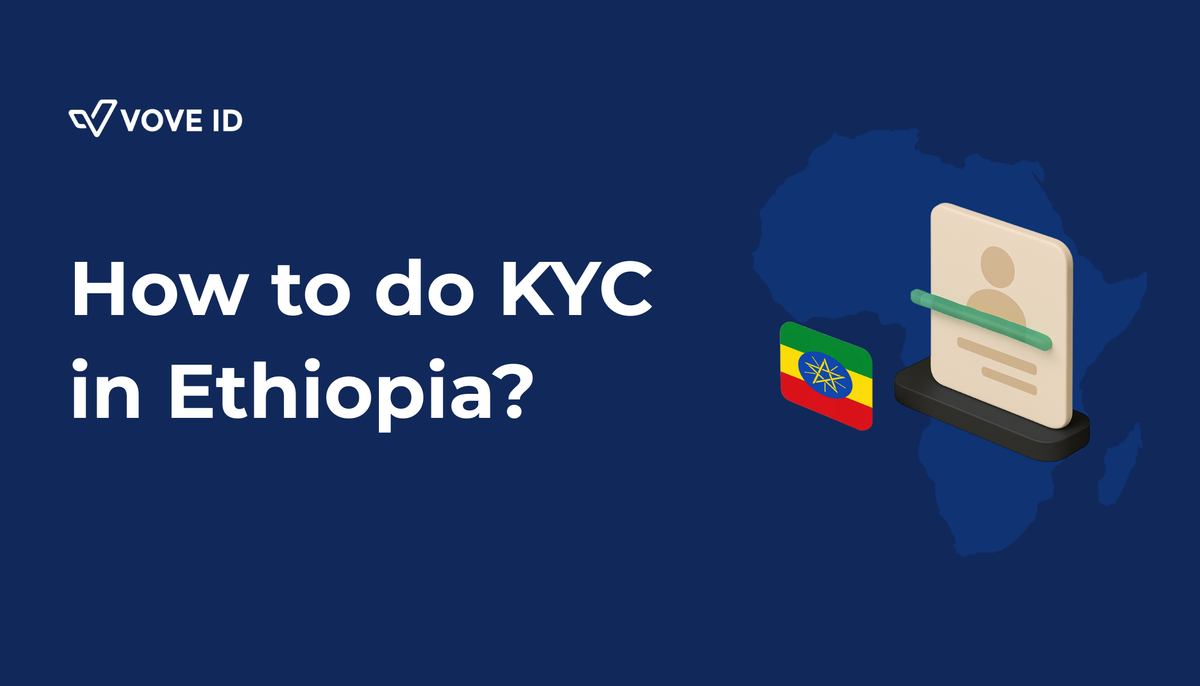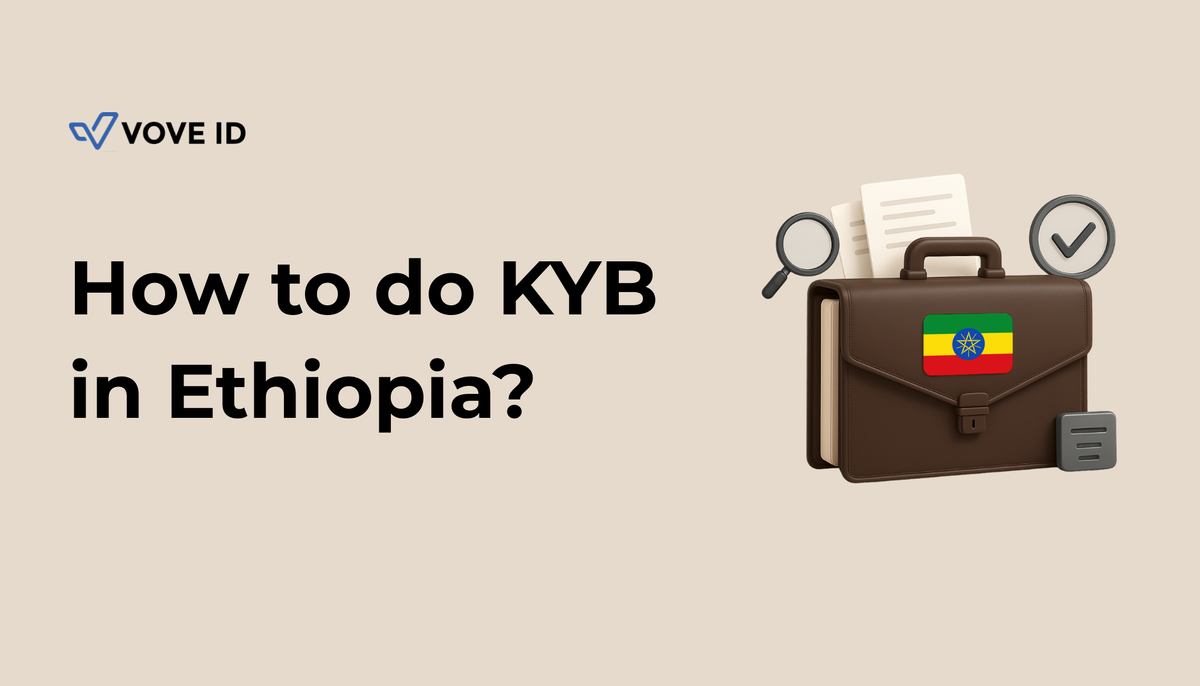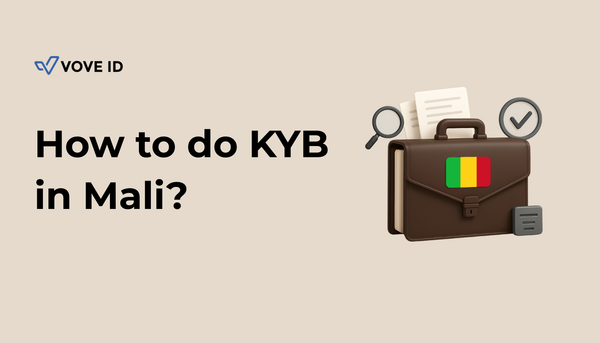AML Compliance in Ethiopia: A 2025 Guide for Fintechs and Regulated Businesses
Discover Ethiopia’s 2025 AML/CFT regulatory landscape, compliance challenges for fintechs, and how AI-powered solutions like VOVE ID streamline secure onboarding and regulatory adherence.

Ethiopia’s financial sector is booming, fueled by a surge in digital payments, mobile money platforms, and fintech innovation. With a GDP of $126 billion in 2023 and a young, tech-savvy population of over 120 million, the country is a hotspot for financial growth. However, this rapid expansion comes with risks: money laundering, terrorist financing, and illicit financial flows (IFFs) threaten the integrity of Ethiopia’s economy.
To counter these risks, Ethiopia has fortified its Anti-Money Laundering and Countering the Financing of Terrorism (AML/CFT) framework, aligning with global standards set by the Financial Action Task Force (FATF) and the Eastern and Southern Africa Anti-Money Laundering Group (ESAAMLG). For fintechs, banks, and regulated businesses, staying compliant in 2025 is critical to thriving in this dynamic market. This guide explores Ethiopia’s AML landscape, compliance challenges, and how solutions like VOVE ID can help businesses navigate this evolving ecosystem.
If you’re curious about KYC and KYB in Ethiopia, check out these articles on VOVE ID’s blog:


Regulatory and Institutional Framework
Ethiopia’s AML/CFT regime is anchored by robust institutions and legislation:
- Financial Intelligence Service (FIS): Previously known as the Financial Intelligence Center (FIC), the FIS is Ethiopia’s central hub for combating financial crime. It collects Suspicious Transaction Reports (STRs), analyzes data, and collaborates with law enforcement to investigate money laundering and terrorist financing.
- Core AML/CFT Laws: The Proclamation on Prevention and Suppression of Money Laundering and Financing of Terrorism (Proclamation No. 780/2013, updated by No. 1176/2020) forms the backbone of Ethiopia’s AML framework. It mandates customer due diligence (CDD), record-keeping, and STR reporting. Recent amendments have introduced risk-based approaches and asset-freezing mechanisms aligned with FATF standards.
- Ethiopian Capital Market Authority (ECMA): Established to oversee Ethiopia’s emerging capital markets, ECMA has taken a proactive role in AML/CFT policy. In June 2025, it held stakeholder consultations to finalize draft KYC/AML directives, emphasizing electronic verification and oversight of Virtual Asset Service Providers (VASPs).
- National Bank of Ethiopia (NBE): The NBE issues directives for financial institutions, detailing CDD procedures and risk-based supervision. It also enforces compliance for banks and fintechs operating in Ethiopia’s growing digital economy.
- International Cooperation: As a member of ESAAMLG and the Egmont Group, Ethiopia benefits from global intelligence-sharing and best practices, enhancing its ability to combat cross-border financial crime.
Alignment with FATF and ESAAMLG Standards
Ethiopia has made significant strides in aligning with FATF’s 40 Recommendations. The 2022 ESAAMLG follow-up report rated Ethiopia Compliant for 11 recommendations and Largely Compliant for 25, a marked improvement from its 2017 evaluation. Key achievements include enhanced CDD measures and progress on beneficial ownership transparency. However, challenges persist:
- Incomplete Risk-Based Approach: Ethiopia’s risk-based supervision framework is still evolving, particularly for non-financial sectors.
- Limited Investigative Capacity: Complex financial crimes, such as trade-based money laundering, strain the FIS and law enforcement resources.
- DNFBP Supervision Gaps: Designated Non-Financial Businesses and Professions (e.g., accountants, real estate agents) face inconsistent oversight, increasing vulnerability to illicit activities.
Fintechs must proactively address these gaps by implementing robust internal AML programs that exceed minimum requirements.
Key Risks and Typologies in Ethiopia
Ethiopia’s unique economic and geographic context creates specific AML/CFT vulnerabilities:
- Cash-Dominant Economy: With large segments of the population relying on cash, tracing financial flows remains challenging. In 2020, Ethiopia’s currency demonetization reduced illicit cash flows by boosting formal banking deposits, but cash-based transactions still dominate rural areas.
- Trade-Based Money Laundering (TBML): Ethiopia’s commodity exports (e.g., coffee, gold) are vulnerable to invoice manipulation and under/over-invoicing, a common TBML tactic.
- Informal Remittance Systems: Hawala networks, widely used in the Horn of Africa, bypass formal financial oversight, posing risks for undetected illicit transfers.
- Virtual Assets: The rise of cryptocurrencies and VASPs introduces new monitoring challenges, as these assets can be used for layering and integration in money laundering schemes.
- Shell Companies: Weak corporate transparency enables the use of shell companies to obscure beneficial ownership and launder funds.
These risks, identified in Ethiopia’s 2016 National Risk Assessment and subsequent updates, highlight the need for advanced transaction monitoring and ownership verification tools.
Recent Reforms and Innovations
Ethiopia’s AML/CFT framework has evolved significantly in recent years:
- Fayda National ID: Launched to streamline identity verification, Fayda supports biometric eKYC, with mandatory adoption for banks in Addis Ababa by January 2025 and nationwide by December 2026. Fayda’s real-time biometric verification (facial recognition, fingerprints) reduces fraud risks during onboarding.
- Virtual Asset Regulation: Draft ECMA regulations extend AML/CFT obligations to VASPs, aligning with FATF Recommendation 15. This includes CDD and transaction monitoring for crypto-related activities.
- Capacity Building: Partnerships with the Global Center on Cooperative Security have trained over 600 professionals across 51 institutions since 2016, enhancing investigative and prosecutorial expertise.
- Risk-Based Supervision: The NBE and FIS have developed manuals for risk-based supervision of financial institutions and DNFBPs, informed by Ethiopia’s updated National Risk Assessment.
These reforms signal Ethiopia’s commitment to a modern, technology-driven AML ecosystem.
Compliance Challenges for Businesses
Despite progress, businesses face significant hurdles:
- Limited Identity Infrastructure: While Fayda is promising, its adoption is incomplete due to technological and training barriers, particularly for smaller enterprises.
- Regulatory Overlap: Navigating directives from the NBE, ECMA, and FIS can create confusion, especially for fintechs operating across sectors.
- Manual Processes: Many institutions still rely on paper-based KYC, increasing errors and slowing onboarding. Between 2018 and 2022, Ethiopia’s digital sector lost 1.9 billion birr to fraud, underscoring the risks of outdated methods.
- Cost Barriers: Advanced AML tools, such as AI-driven screening, can be costly for early-stage fintechs, though they are essential for compliance.
How VOVE ID Supports AML Compliance
VOVE ID’s AI-powered platform offers practical solutions for Ethiopia’s AML challenges, enabling fintechs, banks, and capital market players to comply efficiently. Its capabilities include:
- Biometric eKYC: Uses facial recognition and document verification to authenticate identities against Fayda or passport data, ensuring secure remote onboarding. This aligns with ECMA’s 2025 eKYC guidelines.
- Watchlist Screening: Conducts real-time checks against global sanctions, Politically Exposed Persons (PEP), and adverse media lists, flagging high-risk individuals instantly.
- Beneficial Ownership Checks: Identifies and verifies company ownership structures, reducing risks from shell companies and complex layering schemes.
- Seamless API Integration: Embeds verification workflows into existing platforms, minimizing disruption to user experience while meeting NBE and FIS requirements.
While VOVE ID enhances compliance, it does not eliminate the need for internal AML policies or staff training, nor does it guarantee regulatory approval. Businesses must complement VOVE ID’s tools with robust governance to fully meet Ethiopia’s AML obligations.
Sector Spotlight: Fintech and Digital Wallets
Ethiopia’s fintech sector is thriving, with mobile money platforms like Telebirr and digital wallets driving financial inclusion. Over 70% of Ethiopians own mobile phones, fueling demand for digital payments. However, these platforms are prime targets for money laundering, particularly during the layering and integration stages.
Fintechs must prioritize AML controls to:
- Secure Licenses: The NBE and ECMA require demonstrable AML frameworks for operational licenses.
- Build Trust: Compliance reassures international investors and partners, critical for Ethiopia’s $126 billion digital economy.
- Enable Global Partnerships: Adhering to FATF standards facilitates cross-border collaborations with payment processors and banks.
Fun Fact: Ethiopia’s Telebirr, launched in 2021, onboarded over 20 million users in its first year, showcasing the explosive growth of digital finance—and the urgent need for AML vigilance.
Practical Steps for AML Compliance
To succeed in Ethiopia’s 2025 AML landscape, businesses should:
- Know Your Obligations: Study Proclamation No. 1176/2020, NBE directives, and ECMA’s draft KYC/AML guidelines. Stay updated via FIS and ESAAMLG reports.
- Conduct Risk Assessments: Tailor AML programs to your customer base, product risks (e.g., digital wallets), and geographic exposure.
- Adopt eKYC Tools: Use platforms like VOVE ID for biometric verification and watchlist screening to meet Fayda and ECMA standards.
- Train Staff: Provide regular AML/CFT training for compliance officers and frontline teams to ensure effective implementation.
- Monitor Transactions: Deploy AI-driven tools to detect suspicious patterns, such as rapid cross-border transfers or inconsistent transaction sizes.
- Report Promptly: File STRs with the FIS immediately upon detecting suspicious activity to avoid penalties, which can reach 10 million birr.
💡 Did You Know?
In 2020, Ethiopia’s currency demonetization replaced old banknotes to curb illicit cash flows, leading to a 15% surge in formal banking deposits within months. This bold move, one of the largest in Africa’s recent history, showcased Ethiopia’s commitment to financial transparency.
Conclusion
Ethiopia’s AML/CFT framework in 2025 is a dynamic blend of regulatory reform, technological innovation, and international alignment. With the rollout of Fayda, stricter VASP oversight, and enhanced FIS capabilities, the country is positioning itself as a leader in African financial integrity. However, challenges like incomplete digital infrastructure and regulatory complexity require businesses to stay proactive.
By leveraging AI-powered tools like VOVE ID, fintechs and regulated entities can streamline compliance, reduce fraud, and build trust in Ethiopia’s fast-growing $126 billion digital economy. Combining local expertise with cutting-edge technology, businesses can not only meet AML obligations but also seize opportunities in one of Africa’s most exciting markets.
Want to see how VOVE ID works?






